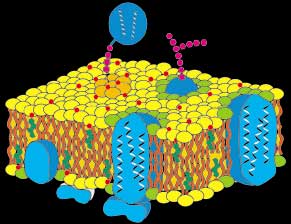Overview
 Genome sequences tell us that membrane proteins make up 25-30% of the proteome of organisms from prokaryotes to humans.
Genome sequences tell us that membrane proteins make up 25-30% of the proteome of organisms from prokaryotes to humans.
Their diverse and fundamental roles in cellular processes throughout the biological world make them a new frontier of biological and biomedical research, which has in the past focused more on soluble components of cells. Membrane proteins and lipids, often in macromolecular assemblies, are responsible for the transport of materials into and out of cells, cell sensing and signal transduction, cell-cell contact recognition, cellular recognition of antigens in the immune system, detoxification of reactive compounds, intracellular compartmentalization and communication between cell compartments, and cell-cell communication via hormones, neurotransmitters, chemokines and other signaling molecules. Membrane functions are therefore vital to health and not surprisingly specific defects in membrane proteins and toxic effects of membrane-active substances are associated with numerous known disease states.

The research activities of Center scientists focus on the biogenesis of membranes and cell compartments, lipid-protein interactions, the structure and function of a number of exquisite molecular machines that carry out active transport of ions, metabolic substrates, proteins, and DNA across membranes of both prokaryotic and eukaryotic cells, the mechanisms of membrane proteins in human cells that metabolize drugs and disarm carcinogens, and the structure, function and networking of membrane receptors that transport information from the environment to cytoplasmic signal transduction pathways in microorganisms and human tissues.
The Center is housed in the Department of Biochemistry & Molecular Biology, with researchers also from the Departments of Integrative Biology & Pharmacology, and Microbiology & Molecular Genetics. Ample resources are available to Center scientists to study a variety of experimental systems using multidisciplinary approaches from biochemistry, molecular biology and genetics, cell biology, biophysics, and developing methodologies in X-ray crystallography and functional genomics.